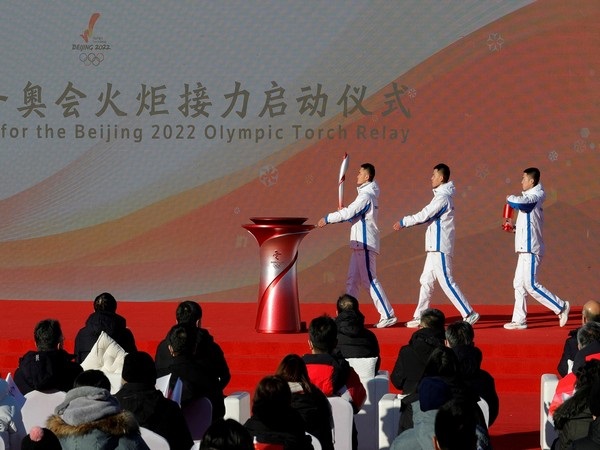 English
English

Two events dominate the Chinese Communist Party (CCP) calendar for 2022 – the Winter Olympics and the 20th Party Congress later this year.

Hong Kong: Two events dominate the Chinese Communist Party (CCP) calendar for 2022 - the Winter Olympics and the 20th Party Congress later this year. China wants both to go smoothly so it can bask in reflected glory. The 2022 Winter Olympics will be wielded as a mighty propaganda tool.
However, things are not so simple for Chairman Xi Jinping, as China is embroiled in worldwide acrimony over harsh treatment of its Uyghur population, its increasing subjugation of Hong Kong, repression of Tibet, illegal territorial claims in the South China Sea, and ramping-up of coercion against Taiwan.
China is pursuing a strict zero-COVID policy, no matter the inconvenience to the populace or the cost to the economy, but there was never any chance of it delaying the Olympics, as happened in Tokyo. The games will run from February 4-20. Xi said the games "will not only enhance our confidence in realizing the great rejuvenation of the Chinese nation," but also "show a good image of our country and demonstrate our nation's commitment to building a community with a shared future for mankind".
Xi boasted in his New Year's address, "The world looks forward to China, and China is ready." It will select only small numbers of Chinese spectators for events, but televised coverage will be carefully choreographed and stage-managed to magnify China's achievements. Chinese media have trumpeted that dignitaries from 32 countries will attend the opening ceremony. Heads of state or royalty are coming from: Argentina, Bosnia-Herzegovina, Cambodia, Ecuador, Egypt, Kazakhstan, Kyrgyzstan, Luxembourg, Monaco, Mongolia, Pakistan, Papua New Guinea, Poland, Qatar, Russia, Saudi Arabia, Serbia, Singapore, Tajikistan, Turkmenistan, the UAE and Uzbekistan.
Other dignitaries include United Nations Secretary-General Antonio Guterres, and World Health Organization Director-General Tedros Adhanom Ghebreyesus. The US was first to declare a diplomatic boycott, and it has since been supported partially or fully by the likes of Australia, Belgium, Canada, Denmark, Estonia, Japan, Kosovo, Latvia, Lithuania, the Netherlands, New Zealand, Sweden and the UK.
China has worked hard to minimize this US-led boycott. Xinhua, for example, wrote, "The so-called US 'diplomatic boycott'...has turned out to be nothing but a flop and the butt of jokes that are scorned by countries across the world." It added, "Any political grandstanding going against the Olympic spirit is detrimental to the interests of all Olympic participants and will fail eventually."
However, Xinhua conveniently glossed over the fact that China is using the Olympics as a political grandstand to glorify the CCP.
Jason Young - the Director of the New Zealand Contemporary China Research Centre and an Associate Professor at Victoria University in Wellington told ANI: "Similar to the 2008 Summer Olympics, the Chinese leadership places a lot of importance on hosting large international events like the Winter Olympics due to their belief that such events provide positive international coverage for China."
Young noted that the running of the Olympics has featured heavily in Chinese media, "where the message to people is that China is hosting a very successful international event".
When asked about the criticism aimed at China, Young explained, "This Winter Olympics has drawn a lot of international criticism due to the diplomatic boycott, uncertainty and strict controls due to COVID, and due to the focus it has put on China's human rights record, including policies in Hong Kong and Xinjiang. To minimize these criticisms in China, state media have strictly managed stories around the Olympics and officials have criticized foreign politicians for 'politicizing' the event."
The elephant in the room is China's authoritarian style of governance, which tends towards totalitarian in areas like Xinjiang. The human rights abuse in the latter are the chilling epitome of China "building a community with a shared future for mankind," to use Xi's words.
2022 is very different to 2008, when Beijing hosted the Summer Olympics. Gaining in self-confidence and national strength, China does not now seek to mollify critics, but rather to defy and bash them.
Back in 2008, many believed the Olympics would help China open up and slacken its autocratic tendencies, but Xi has no intention of China becoming more like the West. Rather, he wishes that the rest of the world will become more like China, and so the 2022 event is a celebration of the CCP's strict rule.
ANI asked Young at Victoria University how important the Winter Olympics are to China's populace. He noted, "It is hard to know just how interested people in China are in the Olympics."
Of course, that is exacerbated by the fact that negative comments are not tolerated on Chinese social media platforms such as Weibo or WeChat. (ANI)
No related posts found.
No related posts found.